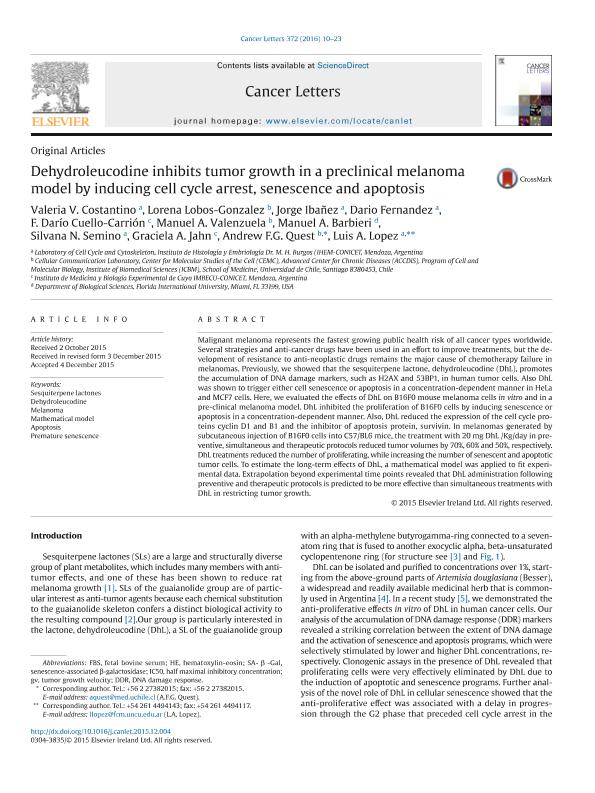Artículo
Dehydroleucodine inhibits tumor growth in a preclinical melanoma model by inducing cell cycle arrest, senescence and apoptosis
Costantino, Valeria Victoria ; Lobos Gonzalez, Lorena; Ibañez, Jorge Ernesto
; Lobos Gonzalez, Lorena; Ibañez, Jorge Ernesto ; Fernandez, Dario; Cuello Carrión, Fernando Darío
; Fernandez, Dario; Cuello Carrión, Fernando Darío ; Valenzuela, Manuel A.; Barbieri, Manuel A.; Semino, Silvana N.; Jahn, Graciela Alma
; Valenzuela, Manuel A.; Barbieri, Manuel A.; Semino, Silvana N.; Jahn, Graciela Alma ; Quest, Andrew F.G.; Lopez, Luis Alberto
; Quest, Andrew F.G.; Lopez, Luis Alberto
 ; Lobos Gonzalez, Lorena; Ibañez, Jorge Ernesto
; Lobos Gonzalez, Lorena; Ibañez, Jorge Ernesto ; Fernandez, Dario; Cuello Carrión, Fernando Darío
; Fernandez, Dario; Cuello Carrión, Fernando Darío ; Valenzuela, Manuel A.; Barbieri, Manuel A.; Semino, Silvana N.; Jahn, Graciela Alma
; Valenzuela, Manuel A.; Barbieri, Manuel A.; Semino, Silvana N.; Jahn, Graciela Alma ; Quest, Andrew F.G.; Lopez, Luis Alberto
; Quest, Andrew F.G.; Lopez, Luis Alberto
Fecha de publicación:
03/2016
Editorial:
Elsevier Ireland
Revista:
Cancer Letters
ISSN:
0304-3835
Idioma:
Inglés
Tipo de recurso:
Artículo publicado
Clasificación temática:
Resumen
Malignant melanoma represents the fastest growing public health risk of all cancer types worldwide. Several strategies and anti-cancer drugs have been used in an effort to improve treatments, but the development of resistance to anti-neoplastic drugs remains the major cause of chemotherapy failure in melanomas. Previously, we showed that the sesquiterpene lactone, dehydroleucodine (DhL), promotes the accumulation of DNA damage markers, such as H2AX and 53BP1, in human tumor cells. Also DhL was shown to trigger either cell senescence or apoptosis in a concentration-dependent manner in HeLa and MCF7 cells. Here, we evaluated the effects of DhL on B16F0 mouse melanoma cells in vitro and in a pre-clinical melanoma model. DhL inhibited the proliferation of B16F0 cells by inducing senescence or apoptosis in a concentration-dependent manner. Also, DhL reduced the expression of the cell cycle proteins cyclin D1 and B1 and the inhibitor of apoptosis protein, survivin. In melanomas generated by subcutaneous injection of B16F0 cells into C57/BL6 mice, the treatment with 20 mg DhL /Kg/day in preventive, simultaneous and therapeutic protocols reduced tumor volumes by 70%, 60% and 50%, respectively. DhL treatments reduced the number of proliferating, while increasing the number of senescent and apoptotic tumor cells. To estimate the long-term effects of DhL, a mathematical model was applied to fit experimental data. Extrapolation beyond experimental time points revealed that DhL administration following preventive and therapeutic protocols is predicted to be more effective than simultaneous treatments with DhL in restricting tumor growth.
Archivos asociados
Licencia
Identificadores
Colecciones
Articulos(IHEM)
Articulos de INST. HISTOLOGIA Y EMBRIOLOGIA DE MEND DR.M.BURGOS
Articulos de INST. HISTOLOGIA Y EMBRIOLOGIA DE MEND DR.M.BURGOS
Citación
Costantino, Valeria Victoria; Lobos Gonzalez, Lorena; Ibañez, Jorge Ernesto; Fernandez, Dario; Cuello Carrión, Fernando Darío; et al.; Dehydroleucodine inhibits tumor growth in a preclinical melanoma model by inducing cell cycle arrest, senescence and apoptosis; Elsevier Ireland; Cancer Letters; 372; 1; 3-2016; 10-23
Compartir
Altmétricas



